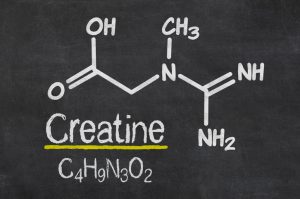Creatine is one of the most widely researched fitness supplements. While it’s main use is for muscle growth, the benefits of creatine are not just for bodybuilders. In this post, we look at what creatine is, how it works, and how it could help you in and out of the gym.
What Is Creatine and How Does it Work?
Before we cover the benefits of creatine, first let’s take a look at what it actually is. Creatine is a compound found in the body. The body produces creatine through protein metabolism. Around 95% of the body’s creatine stores are within muscle tissue. The other 5% is in the kidneys, liver, and brain. Creatine is also found in food. Meat contains the highest amount of creatine. But other sources include eggs, dairy, and shellfish.

Who Should Supplement with Creatine?
Supplementing with creatine increases the body’s natural stores of the substance. As a supplement, it is affordable and proven to be very safe (Buford et al., 1997). This is probably why many fitness supplements contain creatine in some form. However, the benefits of creatine aren’t just for fitness enthusiasts. Creatine supplementation can also improve brain health. It aids many chronic illnesses including depression and dementia (WebMD.com, n.d.), and can also protect against neurological diseases (Matthews et al., 1999).
Let’s now delve a bit deeper into the benefits of creatine.
The Benefits of Creatine for Exercise Performance
Creatine is one of the most effective supplements for exercise performance. It improves both strength and power. This makes it ideal for use in both heavy lifting and high-intensity exercise, as well as many types of sport. One review crowns it the best available sports supplement (Nissen & Sharp, 2003).

The benefits of creatine here are mostly down to its role in the production of a molecule called ATP. Phosphocreatine – a form of creatine stored in muscle tissue – supports the body’s creation of ATP. This molecule provides energy to our cells. ATP is the body’s primary source of energy when it comes to intense exercise. Creatine supplementation allows the body can produce more ATP. This means you can perform better when exercising.
A review found adding creatine to a training program increased weightlifting performance by 14%. Alongside this, strength also increased by 8% (Rawson & Volek, 2003). In another study, creatine increased bike sprint performance by 15% (Earnest et al., 1995).
The ATP-boosting properties of creatine also have positive effects on muscle gain.
The Benefits of Creatine for Muscle Gain
As we’ve discussed, more creatine leads to increased ATP production. Because ATP benefits performance, you’ll be able to lift more in the gym, for longer. This enables you to get more volume in each session. High training volumes are a key aspect of muscle growth. Researchers in one study followed people across a 6-week training regimen. They found that using creatine resulted in 2kg more muscle mass (Francaux & Poortmans, 1999).

Creatine also affects the production of certain hormones associated with muscle growth. For example, IGF1. One study measured levels of IGF1 after resistance exercise. Creatine supplementation increased IGF1 by over 20% compared to controls (Burke et al., 2008).
Satellite Cells and Muscle Growth
The benefits of creatine for muscle gain are also found on the cellular level. On the outside of our muscle fibres are satellite cells. Their function is to repair muscle damage. These cells are usually dormant. But when signalled, they multiply at the site of muscle damage and get to work mending damaged tissue. Through this process, satellite cells help create new muscle fibres (Robson, 2016).
Research shows that creatine improves the signalling and function of these satellite cells. For example, one study measured satellite cell frequency during a course of heavy resistance training. Creatine supplementation increased the number of satellite cells in muscle fibres. As a result, creatine amplified muscle fibre growth in response to exercise (Dangott et al., 2000).
The Benefits of Creatine for Brain Function
Like the muscles, the brain benefits from higher levels of ATP. Supplementing with creatine allows for more ATP production. The brain relies on ATP more when processing difficult tasks. So, through the creation of ATP, creatine can help brain function. Supplementing creatine both improves cognitive ability and reduces mental fatigue (Hebert, 2014).

Studies on vegans and vegetarians reveal the benefits of creatine on the brain. Because only animal products contain creatine, vegetarians and vegans have lower levels of the substance in their brains. One study showed that it had a positive effect on both working memory and intelligence (Rae et al., 2003). Other studies demonstrate how creatine can help omnivores too. For example in one study, researchers gave participants 5 mental exercises. Compared to a placebo, creatine improved performance in these tasks (Ling et al., 2009).
Just like it prevents physical fatigue, creatine sustains the brain as well. In one study, participants performed repeated mental mathematics tasks. They compared mental fatigue in those taking creatine, compared to a placebo. Throughout the experiment, those taking creatine did better in the maths tests and showed less mental fatigue (Wantanabe et al., 2002).
Brain Injuries and Disorders
The benefits of creatine on brain function are also demonstrated in studies on brain injuries. One study observed a 50% reduction in symptoms of dizziness caused by brain injury (Sakellaris et al., 2008). Also, many neurological disorders stem from a creatine deficiency. So supplementing with creatine can improve symptoms. For example, rat studies show creatine aids convulsive disorders (Rambo et al., 2009).
Furthermore, creatine has a positive impact on mood. A study on those with depression highlights the benefits of creatine in this context. In one study, researchers gave patients with depression 3-5g of creatine over four weeks. A second study gave patients 4g of creatine for eight weeks. In both studies, depression symptoms improved and their self-reported mood was better (Allen, 2012).
Summary
It’s easy to get confused with the vast amount of supplements available today. Unlike some supplements, it is widely researched and proven to be very safe. Creatine boosts your workout performance and increases muscle mass. Not only this, but it also amplifies brain function. So why not see how creatine can boost your workout and your brain?

Now you know the benefits of creatine, it’s time to start adding it to your regime! Keen to test out the powers of creatine in the gym? Before you do, why not read how to find the right workout plan. Or, if you want to use creatine for muscle growth, learn how to eat to gain muscle here!
